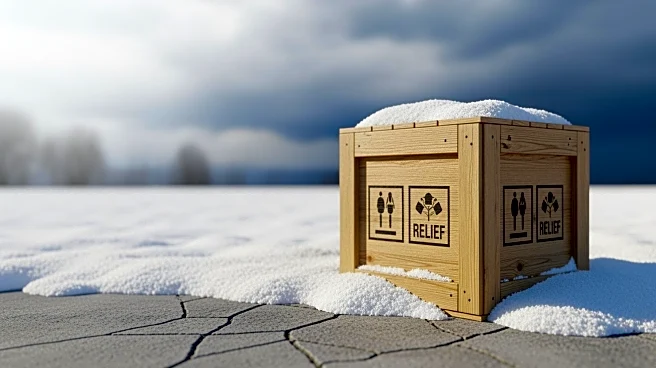What's Happening?
Aid agencies are calling on Israel to permit more tents and essential supplies into Gaza following heavy winter rains that have exacerbated the humanitarian crisis. Jan Egeland, Secretary General of the Norwegian
Refugee Council, warned of potential fatalities due to inadequate shelter. The NRC reports that approximately 260,000 families, or 1.5 million people, require emergency shelter assistance. Despite the US-brokered ceasefire, only 19,000 tents have been delivered, with many supplies blocked due to security concerns and classification as 'dual-use' items. The US-led Civil-Military Coordination Center aims to facilitate aid delivery, but bureaucratic hurdles persist.
Why It's Important?
The situation in Gaza highlights the urgent need for humanitarian intervention to prevent further loss of life and suffering. The winter storms have compounded existing challenges, with widespread flooding and potential disease outbreaks. The restrictions on aid entry underscore the complex interplay between security concerns and humanitarian needs. The involvement of international organizations and the US-led coordination center could help alleviate the crisis, but effective implementation is crucial. The plight of displaced Gazans underscores the broader implications of the ongoing conflict and the need for sustainable solutions.
What's Next?
International aid groups are working with the US-led Civil-Military Coordination Center to plan a comprehensive humanitarian response for the winter. A foreign donor conference on Gaza's reconstruction is expected to take place in Egypt, focusing on long-term solutions. However, immediate action is needed to address the current shelter crisis. The resolution of bureaucratic and political obstacles is essential for the timely delivery of aid. Stakeholders, including Israel and international organizations, must collaborate to ensure that supplies reach those in need and prevent further humanitarian deterioration.
Beyond the Headlines
The humanitarian crisis in Gaza raises ethical questions about the balance between security measures and humanitarian principles. The classification of essential items as 'dual-use' reflects broader geopolitical tensions and the impact on aid delivery. The situation highlights the need for international cooperation and dialogue to address the root causes of the conflict and ensure sustainable peace. The role of the US-led coordination center and the upcoming donor conference may influence future diplomatic efforts and the region's stability. The crisis serves as a reminder of the human cost of conflict and the importance of prioritizing humanitarian needs.










